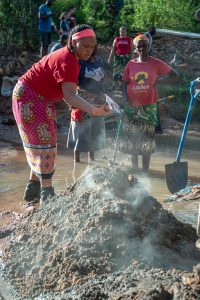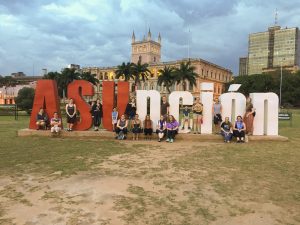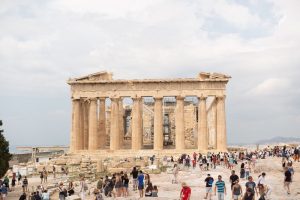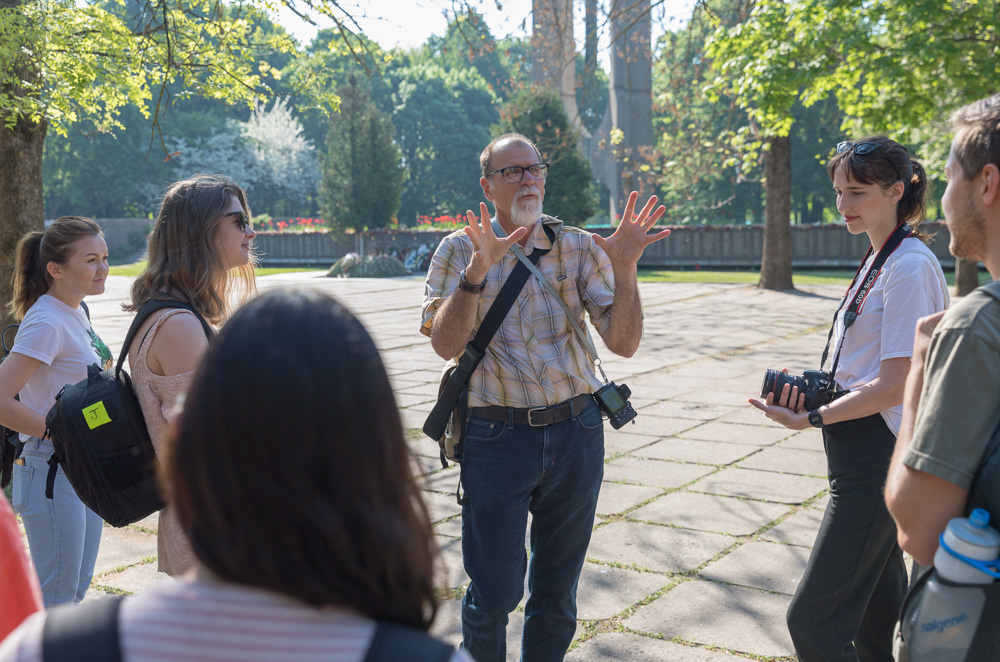Eastern Mennonite University students on cross-culturals this summer are learning about history at memorial sites in Lithuania, taking in cultural events in Paraguay, donning work gloves to help with sand dam construction in Kenya, and more.
Cross-cultural study has been a part of EMU core curriculum for more than 30 years. Graduates have said that the experiences are “life-changing” and provide a foundation for global perspective.

This spring, groups posted a variety of reflections about and photos of their experiences in India and Guatemala and Cuba on the on the EMU cross-cultural blog. While summer groups post less due to their condensed schedules, the travels to Paraguay, Kenya, Bulgaria and Greece, Washington D.C. and Lithuania have provided opportunity for reflection and photography.
In Lithuania, Isaiah Harris-Winn wrote of visiting beautiful cities and memorial sites “for the people who gave their lives for freedom for their people and country” and those executed for faith or race. “These sites help paint the picture that injustices are all around us,” he wrote. “These people were selfless and thought about others before themselves.”
Here’s more information from the leaders of this summer’s cross culturals:
- Bulgaria and Greece, May 19-June 30, led by Professor Andrew White and his wife Daria White: For centuries the Balkans (SE Europe) have been viewed as a civilizational “bridge,” a link between the West and the East. This cross-cultural is exploring the marginal(ized) status of people who live in the SE Balkans, with particular focus on Bulgaria, a relatively unknown nation and the poorest country in the European Union.
- Kenya, May 8-30, led by Professor Roxann Allen Kioko and her husband, Felix Kioko: Kenya is not only the most stable and economically advanced country in East Africa, it is also diverse with over 40 different tribes and extreme income inequality as a former British colony. Its capital city, Nairobi, is seen as a hub for East and Central Africa and many international NGOs. Tourism and agriculture power its economy.
- Lithuania, May 9-June 25, led by Professor Jerry Holsopple: Lithuania is a culture where ancient religion and modern ideology is being challenged by Western consumer culture. North America is a secular, highly religious (often civil), pluralistic, producer of popular culture products exported on the global scale, while Lithuania is just 20+ years beyond the Soviet Occupation. Living and traveling with students from Lithuania and other Eastern European countries is an amazing way to enter into the nexus of this rooted and changing culture.
- Paraguay, May 9-31, led by professors Greta Ann Herin and Laura Yoder:

EMU students in Paraguay explored “the complexity of South American culture.” (Courtesy photo by Mariann Smith) Paraguay is home to native Guarani, to descendants of Europeans, and to German-speaking Mennonites transplanted from Russia, among others. It provides an intriguing locale for exploring the complexity of South American culture. Strong contrasts between modern urban living in Asuncion and agrarian, rural colonies in the Chaco highlight the variety of cultures within Paraguay.
- Washington D.C. (Washington Community Scholars’ Center): Gain experience with vocational development, group living, and coursework on urban topics in this cross-cultural context.
Fall 2018 semester trips will include:
- China, led by professors Mary Sprunger and Myrrl Byler: Go behind the history textbooks and headline news to experience the real China. With the world’s largest population and an economy that is expected soon to exceed that of the U.S., no other single culture or country will affect our

The Parthenon of Greece, where EMU students are visiting this summer. (Courtesy photo by Andrea Cable) lives in the coming decades as significantly as that of China. Yet China’s rich history of over 4000 years is little known and little understood in the western world. Because of China’s size, population and rapid pace of change, it faces incredible social, environmental and political challenges.
- Washington Community Scholars’ Center
Spring 2019 semester trips include:
- Guatemala and Spain, led by Byron Peachey and Deanna Durham
- Middle East, led by Linford Stutzman and Janet Stutzman
- Washington Community Scholars’ Center
